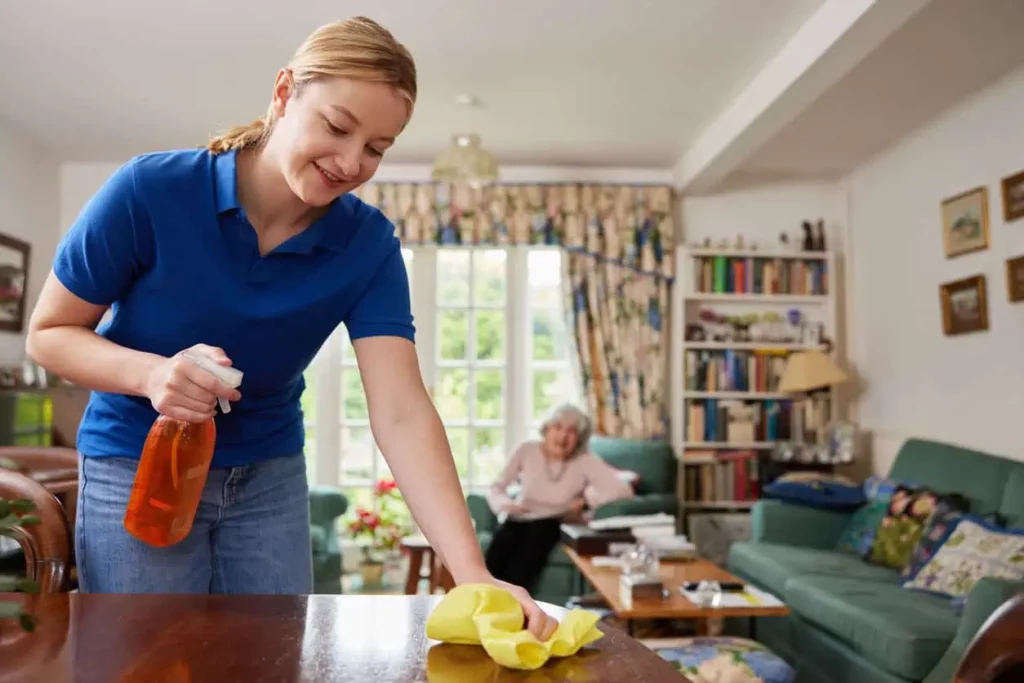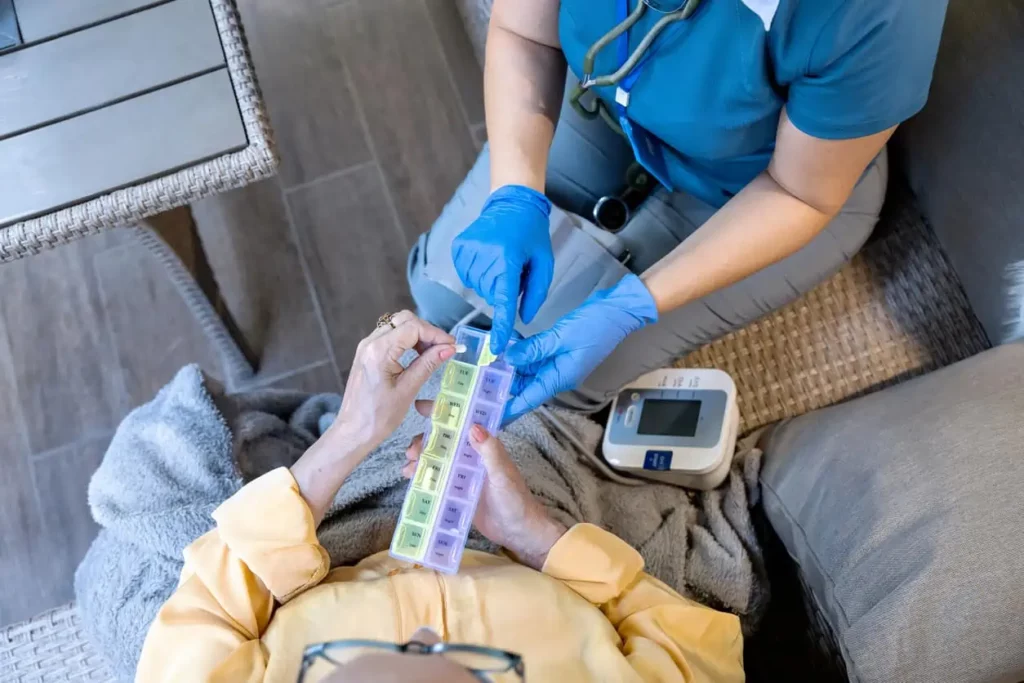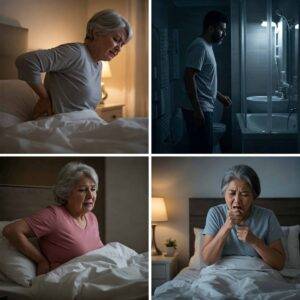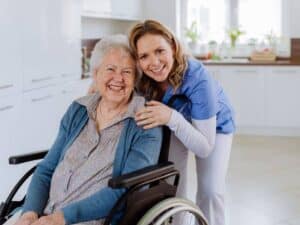Are you considering a career in senior home care, or perhaps just looking for a way to give back to your community? In-home care for seniors is a fulfilling and rewarding career, but it’s important to know what you’re getting into before you take the plunge.
In this article, we’re going to talk about six different types of in-home senior care jobs and break down their pros and cons. Whether you’re a seasoned caregiver or a newbie, this guide will help you understand the variety of services, benefits, and drawbacks each job has to offer. So, let’s dive in and take a closer look at the different types of in-home senior care jobs available!

Live-In Companions
Home companions for seniors are individuals who provide companionship, socialization, and engagement activities to seniors to improve their overall well-being. They can also do some light housekeeping tasks such as laundry and cleaning as well as light meal preparation.
Responsibilities
Duties of live-in companions include:
- Home companions are responsible for providing socialization and companionship to seniors.
- They also assist with activities such as reading, playing games, and going out for walks.
- Home care companions engage in conversations and activities that align with the senior’s interests.
- They also assist seniors with the senior’s hobbies and interests.
- Senior care companions assist with housekeeping tasks such as laundry and cleaning.
- They also ensure that the senior is properly fed by preparing meals for them.
Benefits
The job of a live-in companion has the following benefits:
- It offers the advantage of improving the emotional well-being of seniors through companionship and socialization.
- Another benefit is the opportunity to establish close relationships with the seniors in your care.
- Live-in companion jobs often have the benefit of flexible scheduling options which allows for a good balance between work and personal life.
Disadvantages
The downsides of this job may include:
- Emotional demands of the job can be difficult.
- There is potential for caregiver isolation or loneliness due to living in the senior’s home
- They may have lower wages than other kinds of caregivers. Since companion care is not covered by the Fair Labor Standards Act, people are not legally bound to pay them the minimum wage.

Personal Care Assistants
In-home personal care assistants (PCAs) provide assistance to individuals with activities of daily living (ADLs) and other house chores in their own homes. Compared to home care companions, they have more responsibilities and provide more hands-on care.
Responsibilities
The responsibilities of an in-home PCA can vary depending on the specific needs of the elderly. Some of their duties are:
- Personal care assistants are responsible for assisting with activities of daily living (ADLs) such as bathing, dressing, and grooming.
- They also help with housekeeping tasks such as laundry and cleaning.
- Personal care assistants ensure that elderly people are receiving proper nutrition by preparing meals and monitoring their eating habits.
- They also assist with mobility, including transferring older adults from bed to wheelchair and taking them outdoors.
- They provide companionship and emotional support to seniors.
- They also help with managing medication and taking them to appointments.
Benefits
Some common benefits of being a personal care assistant are:
- They work in a one-on-one setting, providing a personal and intimate care experience
- They can work in the comfort of the elderly’s own home
- They can use flexible scheduling to gain a balance between work and personal life.
Disadvantages
The disadvantages of being a personal care assistant are:
- The job can be physically demanding and may require lifting, bending, and standing for long periods of time.
- They need to work flexible hours, including evenings and weekends, which can be difficult for those with family or other commitments.
- They can suffer from burnout or compassion fatigue, which can affect their well-being and the quality of care they provide.

Home Health Aides
Home health aides (HHAs) are trained individuals who provide health-focused assistance to seniors and people with disabilities in their own homes. They are trained to work with individuals who have various physical, cognitive, and emotional needs, including those with chronic conditions, disabilities, or those recovering from an illness or surgery.
Responsibilities
The responsibilities of a home health aide for seniors include:
- Home health aides are responsible for evaluating and monitoring the elderly’s physical, mental, and emotional well-being.
- They also help with activities of daily living such as bathing, dressing, and grooming.
- They support older people with mobility by assisting them in transferring from bed to wheelchair or using assistive devices.
- Home health aides administer medication, as directed by a healthcare professional.
- They provide wound care and other medical treatments.
- They are also responsible for monitoring vital signs and keeping seniors healthy.
- They keep the elderly’s healthcare providers and family members informed of their condition and care plan.
Benefits
Some benefits of being home health aides:
- They can provide daily one-on-one care, which leads to a deeper understanding of seniors’ needs and preferences.
- They get the opportunity to work with older adults, which can be a rewarding experience for those who have a passion for eldercare.
- They get to work in a variety of settings, such as private homes, assisted living facilities, or adult daycare centers.
Disadvantages
A few disadvantages of being a home health aide:
- They lack the autonomy to make clinical decisions
- They can be exposed to infectious diseases and health hazards
- There are limited career advancement opportunities in comparison to other healthcare professions.

Certified Nursing Assistants (CNAs)
Certified nursing assistants (CNAs) are trained and certified to provide basic medical care and assistance to individuals who are unable to care for themselves due to illness, disability, or age.
Responsibilities
Their responsibilities may include:
- CNAs perform basic nursing tasks such as taking vital signs, monitoring seniors’ conditions, and administering medication.
- They also assist with more complex medical procedures such as wound care and catheter care.
- They help with mobility and activities of daily living.
- They can also educate and train older adults and their family caregivers on disease management and self-care techniques.
Benefits
Senior home care CNAs have the following benefits:
- They provide hands-on care and make a direct impact on the elderly’s health outcomes.
- Senior home care CNAs also get the opportunity to gain a diverse range of experience by working with different kinds of older people and medical conditions.
- There is a potential for career growth and advancement to higher levels of nursing.
Disadvantages
A few disadvantages of being a Certified Nursing Assistant (CNA) include:
- The nature of the job may be stressful and demanding, as CNAs may work long hours with seniors.
- They need to work with a high level of responsibility as CNAs are required to make clinical decisions and perform nursing tasks independently.
- They are at risk of exposure to infectious diseases and other health hazards in older people’s homes.

Registered Nurses (RNs)
Registered Nurses (RNs) are trained and licensed to provide nursing care services to seniors in their homes. They are different from home health aides; they are qualified and licensed, have more autonomy to practice, and can provide more complex medical care.
Responsibilities
Some common responsibilities of Registered Nurses (RNs) include:
- Registered Nurses assess seniors’ conditions and develop care plans.
- They also administer medication and monitor vitals.
- RNs also educate older adults and their families on disease management and patient care.
Benefits
The benefits of Senior Home Care Registered Nurses (RNs) include:
- In-home Registered Nurses (RNs) utilize a person-centered approach and address the unique needs of older adults in their homes.
- They can work independently and make clinical decisions, with the authority to assess, plan, implement, and evaluate the care of seniors.
- They work in a variety of settings, such as private homes, assisted living facilities, or adult daycare centers, which can provide diversity in work experiences.
Disadvantages
A few disadvantages of being Registered Nurses (RNs) include:
- Home Care Registered Nurses are prone to high levels of stress and emotional burnout due to the nature of the job and the patient population they serve
- They need to work flexible hours and be on-call as the needs of the elderly may require care outside of regular work hours
- They have to work independently and make clinical decisions, which requires a high level of responsibility and accountability.

Therapists
Senior home care therapists provide specialized rehabilitative treatment and support to older adults in their homes. They may include physical therapists (PTs), occupational therapists (OTs), speech-language pathologists (SLPs), and mental health therapists (MHTs). They work in collaboration with a team of healthcare professionals and family members to provide comprehensive care to older adults in their homes.
Responsibilities
Therapists provide different kinds of services, such as:
- PTs provide rehabilitation for older adults recovering from injuries and surgeries or managing chronic conditions such as arthritis, back pain, and stroke. They use exercise, manual therapy, and assistive devices to help elderly people regain strength, flexibility, and mobility.
- OTs enable seniors to regain the ability to perform daily activities, such as dressing, grooming, and cooking, after an illness or injury. They may also provide adaptive equipment and modifications to the home environment to improve safety and independence.
- SLPs help the elderly with communication or swallowing difficulties.
- MHTs provide treatment for various mental health conditions in seniors, such as depression, anxiety, dementia, and Alzheimer’s.
Benefits
Home care therapists enjoy the following benefits:
- They can provide continuity of care by regularly visiting seniors in their homes and tracking their progress over time.
- They get the opportunity to perform functional assessments in the elderly’s natural environment which can provide a more accurate representation of their abilities.
- They can utilize home modifications and adaptive equipment to improve mobility, safety, and independence.
Disadvantages
The downsides of being a home care therapist may be:
- There is a potential for exposure to infectious diseases and other health hazards, such as falls, in older people’s homes.
- They have limited access to equipment and supplies that may affect the quality of care provided.
- They need transportation to elderly’s homes which can be challenging in remote or underserved areas.

Conclusion
Home care jobs are careers that involve providing care and assistance to patients in their own homes. They can make a big difference in the lives of those they help, and offer a great opportunity to join the healthcare industry and make a positive impact.
To find home care job opportunities, you can search online using websites such as “careers” or “employment” sections of home care companies’ sites. Some of these sites might require you to enable javascript to fully use all the features. Make sure to review the privacy policy and terms of service before applying for a job, as these documents outline the company’s policies on privacy, security, and employee rights.
At many home care companies, employees receive training and education to ensure the best performance for their patients. National and state regulations govern the healthcare industry, so it’s important to learn about the policies and laws that impact your work. The culture of a home care company is also an important factor to consider when choosing a job.
Look for organizations with strong leadership and a commitment to equal and fair treatment of their employees. Good home care companies prioritize the well-being and security of both their patients and employees and strive to make a positive difference in their communities. If you’re looking to make a difference in people’s lives and want to join a team of professionals who are dedicated to providing high-quality service, a home care job might be a great fit for you!
In-home senior care jobs involve providing specialized medical and non-medical assistance to older adults in their homes. You can expect to work with older adults who may have difficulty caring for themselves due to age-related physical limitations or chronic health issues. Depending on the type of home care job, your duties can range from companionship, housekeeping, assisting in ADLs, providing rehabilitation, managing medication, and taking them to appointments. Overall, home caregivers get to work closely with seniors and their families to help them recover and promote physical independence and self-care in older adults.




